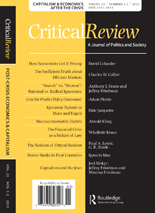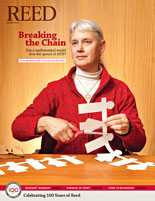
IRIS login | Reed College home Volume 91, No. 1: March 2012
Reediana
“An Inefficient Truth”
Charles Collier ’72 (Essay in Critical Review, Vol 23, No. 1-2, 2011)
Reviewed by Robert Teitelman

In the fitful debate about the role of the market in the financial crisis, the efficient-market hypothesis looms as a sort of loyalty test. If you’re a conservative, free-market type—a Randian, Austrian, Milton Friedman-meets-Ronald-Reagan Chicagoan with a supply side streak—you view the notion of market efficiency as broadly correct; the market really can process available information “efficiently,” certainly better than cartoon bureaucrats in Washington can, and thus produce roughly “correct” prices (this is also one explanation for why the market is so hard to beat).
If you’re more distrustful of the market, brought up short by Stiglitzean market breakdowns and convinced of imperfect competition and wandering equilibria, you view the efficient market, and its accomplice, the rational-expectations hypothesis, as dangerous fantasies belied by empirical reality. Not surprising, that latter point of view has been accumulating adherents after a period in which the efficient-market hypothesis seemed to reign supreme. That reign ended with the kind of market breakdown that proponents of the “strong” version of the efficient hypothesis had all but ruled out as impossible. This has proved to be a problem for the efficient crowd.
圣
The issue comes down to testability. How do we know that these prices are “correct,” based on available information? Can the hypothesis be falsified, as Karl Popper once defined scientific statements? This proves to be difficult, not least because financial markets are forward-looking, and so we are always analyzing current prices as reflections of future projections. How do we know prices reflect a rational interpretation of available data or a collective set of views, some of which may be “right” while others are clearly “wrong”—that makes no progress toward equilibrium? After all, in the short run, market prices clearly move in a random walk. How do we interpret that? As Collier writes, “Prices may be wandering randomly not because the market is reacting to unpredictable new information, but because the consensus is unwittingly traversing the periphery of a colossal bubble that formed for no fundamental reason and is about to burst for no good reason either.”
Even the University of Chicago’s Eugene Fama, the father of the efficient-market hypothesis, recognized the difficulty of proving the concept. To test the hypothesis requires both actual prices and a sense of the corresponding equilibrium price in the future. “Market efficiency per se is not testable,” wrote Fama in a 1991 paper. “It must be tested jointly with some model of equilibrium, an asset-pricing model. . . . We can only test whether information is properly reflected in prices in the context of a pricing model that defines the meaning of ‘properly.’ As a result, when we find anomalous evidence on the behavior of returns, the way it should be split between market inefficiency or a bad model of market equilibrium is ambiguous.”
As Collier comments, this is like seeing a car driven poorly and not being able to figure out if it’s the fault of the car or the driver.
在
Collier covers a lot of ground. He raises the question whether there is a kind of uniform rationality shaping markets—or whether investors adopt a range of impulses, from self-fulfilling prophecies to “election” behavior, in which speculators judge not whether the price is right or wrong but what the crowd thinks about the price (this observation was famously articulated by John Maynard Keynes in his metaphor of the newspaper beauty pageant). “If an ‘electorate’ that is ignorant or irrational is determining market prices,” he writes, “then trading based on a correct and rational bet against current prices would perform poorly relative to a weighted market index.” Prices may never catch up and return to a theoretical equilibrium. Markets can easily grow “unbalanced and unstable.”
再保险


LATEST COMMENTS
steve-jobs-1976 I knew Steve Jobs when he was on the second floor of Quincy. (Fall...
Utnapishtim - 2 weeks ago
Prof. Mason Drukman [political science 1964–70] This is gold, pure gold. God bless, Prof. Drukman.
puredog - 1 month ago
virginia-davis-1965 Such a good friend & compatriot in the day of Satyricon...
czarchasm - 4 months ago
John Peara Baba 1990 John died of a broken heart from losing his mom and then his...
kodachrome - 7 months ago
Carol Sawyer 1962 Who wrote this obit? I'm writing something about Carol Sawyer...
MsLaurie Pepper - 8 months ago
William W. Wissman MAT 1969 ...and THREE sisters. Sabra, the oldest, Mary, the middle, and...
riclf - 10 months ago